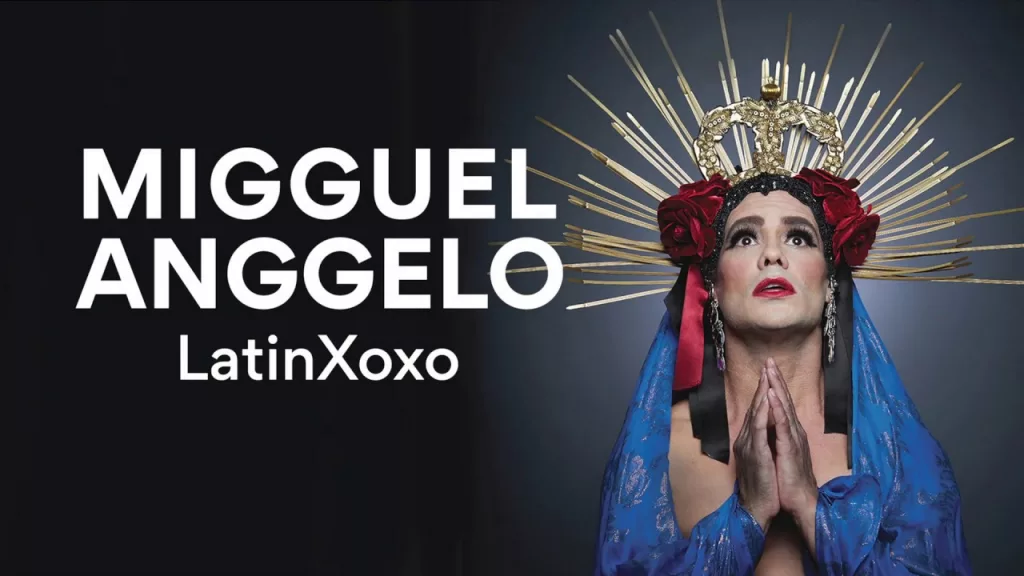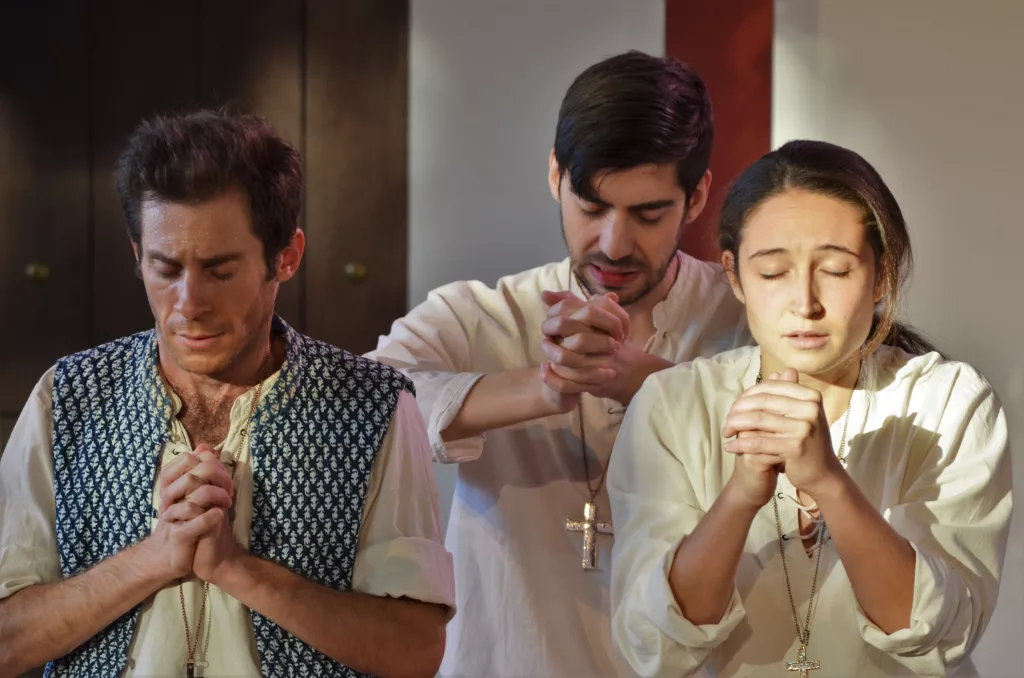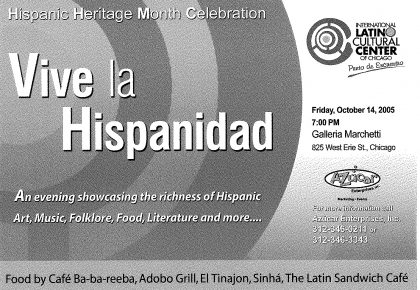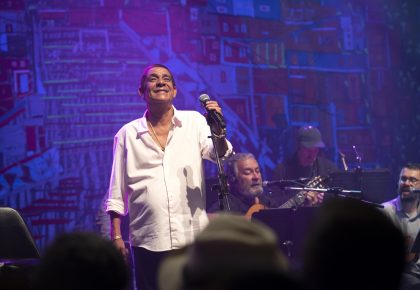
This is the fourth in a series of columns celebrating the 25th anniversary of the International Latino Cultural Center of Chicago and its many accomplishments. The ILCC is currently engaged in a fundraising campaign to raise the funds necessary to help the organization increase its free citywide programming as well as create new multi-disciplinary programming and fund the infrastructure that will make these programs possible.
“It’s important that our stories be told as honestly as possible and that they be authentic voices that are speaking from the heart,” playwright, filmmaker and founder of Teatro Campesino Luis Valdez told a reporter from KSBW Action News in Monterey, California in 2021.
Of all the seven programming pillars of the International Latino Cultural Center, theater is the one that best exemplifies Valdez’s beliefs. Live theater allows audiences to immediately perceive if an actor or playwright is being honest to themselves and to the stories they are telling. Actors can create the illusion they are speaking directly to their audiences. Actors can immediately feel the acceptance or reproach of their audiences. That interaction alone creates an energy that is unique. And unlike movies, where performances are forever set on celluloid or digital, actors can feed on that energy and deliver a performance that may be slightly different each night.
A month and a half run of Rick Najera’s Latinologues: Comedy with no Borders is the earliest record we have in our archives of a theatrical performance presented by the International Latino Cultural Center post-name change. Coming off a nine month run in Los Angeles, the play, written and starring Najera (a former writer for the Wayans’ family Fox comedy show In Living Color) and co-starring actor Jacob Vargas (American Me, Mi Familia and Selena), was staged at the Victory Gardens Theater in Lincoln Park from February 4-April 2, 2000. A Mexican Moses who promises to take his followers to the promised land of Chicago; a gay Latino producer trying to convince a chicano scriptwriter to work on a project about Hernán Cortez; and a Mexican-American agent of la migra were among the characters portrayed by Najera, Vargas and their weekly guests from LA’s improv and theatrical circuits.
A month-long run of Cuban-American playwright and actress Carmen Pelaez’s first one-woman show, Rum & Coke, directed by Susan V. Booth (currently the Walter Artistic Director at the Goodman Theatre) followed. Sponsored by the ILCC in cooperation with Columbia College Chicago and presented by Pegasus Players (now Pegasus Theatre Chicago) from September 13-October 22, 2000 at Truman College’s O’Rourke Center in the Uptown neighborhood after a sold-out run in Miami, Rum & Coke centered on Camila, the U.S. born daughter of Cuban exiles, as she prepares for a trip to Havana.
The ILCC presented another one woman show during that time: Cuban-Rican playwright Marga Gómez’s jaywalker at the Black Orchid Classic Night Club in Old Town. Performed on October 7, 2000, jaywalk pokes fun at the film and television industry’s stereotyping of Latinos as it traces Marga’s quest on becoming the first Lesbian to be cast on the then popular television series Baywatch.
The following year, the Center brought to Chicago from Honduras Teatro La Fragua’s production of Romero de las Américas, to the Getz Theatre of Columbia College from September 28-30, 2001. The play, originally written by Carlos Morton as The Savior, and re-written in 1998 with members of La Fragua, uses traditional dances as well as corridos, rock music, and a minimalist set design to tell the story of how Salvadoran Archbishop Oscar Arnulfo Romero became the voice for human rights in his country and all of Central America until he was assassinated by in 1980 while giving mass by members of a death squad. Still active, Teatro La Fragua was founded in Olanchito, Honduras in 1979 by Jack Warner, a Jesuit priest and graduate of Chicago’s Goodman Theater School (now the Theater School at DePaul) with the idea of awakening the people’s creativity to further empower and enrich them. The troupe is composed of young, marginalized men and women who developed their acting skills through a series of workshops.
References to other theatrical productions can be found in Panorama, the ILCC’s quarterly newsletter mailed to members between 2000-2004. Three theatrical productions were announced in the Fall 2002 newsletter beginning with a program of two short plays produced by the local theater company Cuerda Flojas Arts Troupe led by actor Eduardo Von: El oso, based on Anton Chekhov’s story about a landowner who comes to collect an outstanding debt from a young widow; and Puros cuentos, an experimental theater piece based on three short stories by Octavio Paz, Juan Rulfo and Chekhov. The program was presented on September 13 and 15 at Teatro Luna’s space on 18th street in Pilsen.
(A word about Teatro Luna before we continue this trip through history. Founded in June 2000 by Coya Paz and Tanya Saracho, Teatro Luna was Chicago’s first full all-Latina theatre ensemble. For more than ten years, they staged original collective shows throughout the city and in their own space in Pilsen and later Lakeview. They also created programs that nurtured and trained Latinas in the art of playwriting, directing, acting and production. After trying to operate in both Los Angeles and Chicago, especially after so many of them found new opportunities on the West Coast, the company settled in the Boyle Heights neighborhood of L.A. and changed its name to Studio Luna where they continue to empower Latinas through workshops and performances.)
On September 20 and 21, 2002, the ILCC presented Chilean troupe Teatro del Puente’s production of Ojos rotos, the story of one woman’s dementia told through dance and song and based on Almudenas Grandes’ 1996 short story Modelos de mujer, at the Chicago Historical Society (now Chicago History Museum). Then from September 27-29, the ILCC presented Mujeres en la guerra, based on Colombian journalist Patricia Lara’s book about three women who have to deal with the legacy of Colombia’s Civil War. The play was staged at the Getz Theater but, unfortunately, there is no mention in the newsletter of the company responsible for its production.
Only one play was presented by the ILCC in 2003 (at least based on what is available in our archives): Argentinean theater group Tespico’s production Pagar el Pato: Tango para dos from August 1-3 at Columbia College Chicago’s Music Department. Written by Dino Armas, considered a master of the grotesque and absurd in Uruguay, Pagar el pato tells the story of Roma, a woman with a hideous and monstrous scar, and Omar, the man who seeks to benefit from her misery. In a review published on August 16, 2003 in the Uruguayan daily El país, Elbio Barilari (who later became the co-artistic director of the Chicago Latino Music Festival) praises the work of directors Patricia Pisani and Graciela Balletti and the choreography they created around Rodolfo Mederos’ music.
And now, as Monty Python would say, for something completely different. The ILCC joined forces with the Mikey O Comedy Show, a pioneer programmer of Latino stand-up shows in Chicago, to launch in 2004 a series titled CHISTES with three nights of comedy at Joe’s Bar on Weed Street in the Lincoln Park neighborhood. The first show held on October 29 featured Chicago’s Patti Vazquez telling stories about growing up in an Irish-Mexican-American family, working in unsatisfying jobs and humiliating moments at the doctor’s office. Audiences were invited to dress in full costume (the event took place days before Halloween and Día de los Muertos) to win tickets for the following year’s Chicago Latino Film Festival.
Then, on November 12, L.A. comedian Noe González headlined a night of comedy featuring several local comedians and on January 21, 2005, Vasquez returned to Joe’s on Weed for an encore performance featuring comedians Alex Ortiz, Ricky Carmona and Joey Villagomez. A year later, on September 30, 2025, the series moved to Chromium Night Club on Fulton Market with headliners Luke Torres (In Living Color), Sara Contreras (The View, Third Watch) and Eric Nieves, described by the promotional materials as the most sought-after Latino comic in New York at the time.
On January 19, 2006 the series went back to Joe’s with performances by Vasquez, Ortiz, Vince Acevedo, Ricky Carmona, Villagomez and Chon.
Unfortunately, there are no records in our archives of any theatrical or stand-up events. That doesn’t mean that there weren’t any produced or presented in the last ten years. It just means that, like most not-for-profit organizations, especially arts organizations, the ILCC did not have the foresight to preserve for posterity many of the materials (photos, brochures, press clippings) for most of the events produced during these past 25 years.
In 2016, the ILCC announced that it was joining forces with the National Museum of Mexican Art and the Puerto Rican Arts Alliance, and arts executive Myrna Salazar (who from 2007-2011 was the Center’s Director of Development and Marketing) to create the Chicago Latino Theater Alliance (CLATA). The Alliance’s mission is to support the development of emerging and established Latino playwrights, actors, directors and theater professionals and cultivate a vibrant and inclusive theater community. CLATA’s signature event Destinos: The Chicago International Latino Theater Festival, brings together dozens of theater companies and artists from Chicago and all over Latin America in venues across the city.

Working for the first time with Center on Halsted, a gay, lesbian, transgender and community center located in the heart of what is known as Boystown in Lakeview, The International Latino Cultural Center presented from July 20-22, 2023, the Chicago premiere of Venezuelan actor and transdisciplinary artist Migguel Anggelo’s theatrical experience, LatinXoxo, in the Center’s main stage. The 70-minute long show combines original and reinterpreted music with dance and theater, and explores the connections of Anggelo’s Latino immigrant identity to his search for freedom.
Three years ago as well, the Center started co-presenting and promoting some of the Latin American plays and companies Physical Theater Festival Chicago programmed as part of its annual event. Launched in 2014 by Alice da Cunha and Marc Frost through the Artistic Associate program at Links Hall, Physical Theater Festival Chicago presents new forms of theater that are being performed around the world.

Marrano: a Tale from the Inquisition, a riveting tale about intolerance and religious persecution presented as part of the 10th Annual Physical Theater Festival Chicago at Theater Wit, July 13-15, 2023, marked the beginning of this collaboration. Produced and staged by the Spanish-Israeli company LaPercha Teatro, Marrano: a tale from the Inquisition focuses on the assassination in Zaragoza, Spain, of Pedro de Arbúes, the highest representative of the Holy Inquisition in 1485. Five actors played more than twenty characters; in order to recreate the Jewish culture of that time, ancient Sephardic melodies and Hebrew prayers were sung and performed.
The following year, again at Theatre Wit, both presented Macacos from July 18-20, 2024. Written, directed and performed by Clayton Nascimento, the actor uses nothing more than his own body, voice and a lipstick, to bring the story of Brazil and slavery to the stage, from rulings by the Portuguese Court during slavery to the present day, when executions of black people by the police go unpunished.
And this year, they co-presented one of The Guardian’s top 10 best theatre shows of 2024: REWIND by Epheremal Ensemble from June 5-7 at Theatre Wit. The play invites audiences to witness the investigation of a crime secretly buried through powerful live music, energetic physical theatre and striking visual imagery. Ephemeral Ensemble drew from real testimonies of Latin American refugees and migrants across generations, weaving their stories with the groundbreaking science of Forensic Anthropology—the first discipline in history dedicated to investigating human rights violations.
For now, the lights have temporarily gone dark for the ILCC when it comes to any future theatrical presentations. Here’s how you can help the ILCC keep that curtain raised:
As part of its fundraising campaign commemorating its 25th anniversary, the International Latino Cultural Center will be hosting a dinner celebration at CineCity Studios, 2429 West 14th St. on Friday, November 14, featuring a solo performance from Grammy® and Latin Grammy® Award winning artist Alex Cuba and the very best in Latino cuisine. Doors open at 6 p.m. For more information, visit the ILCC’s official fundraising dinner page.
Unable to make the event? Never fear, you can still be part of our campaign with your individual contribution. Every single bit helps our mission to preserve in the city of Chicago a space for Pan-Latino arts in all its glorious disciplines. For more information on individual giving visit our individual giving page.
The International Latino Cultural Center of Chicago is a 501(3)(c) nonprofit cultural organization. All contributions are tax-deductible to the full extent allowed by the law.

